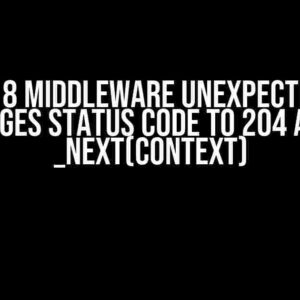Introduction
As a seasoned developer, you’ve likely encountered the conundrum of linking implicitly against an import library and calling a function exported by ordinal. But is it possible? The answer might surprise you. In this article, we’ll delve into the world of import libraries, ordinal exports, and implicit linking, providing clear instructions and explanations to help you overcome this challenge.
What are Import Libraries and Ordinal Exports?
Before we dive into the meat of the matter, let’s define the key terms:
- Import Library: An import library is a static library that contains the stubs for the functions exported by a DLL. It’s generated by the linker when creating a DLL and is used to resolve imports at link-time.
- Ordinal Export: An ordinal export is a function exported by a DLL using an ordinal number instead of a name. This means that instead of exporting a function with a specific name, the DLL exports it with a numerical identifier.
The Problem: Implicit Linking and Ordinal Exports
So, what’s the issue? When you link implicitly against an import library, the linker resolves the imports by matching the function names. However, when a function is exported by ordinal, the linker doesn’t know how to resolve the import. This is because ordinal exports don’t have a name to match.
This poses a challenge when trying to call a function exported by ordinal from an import library. But fear not, dear developer, for there is a solution!
Solution 1: Using GetProcAddress
One way to call a function exported by ordinal is to use the GetProcAddress function. This allows you to retrieve the address of the exported function and call it directly. Here’s an example:
// Assume the DLL exports a function with ordinal 123
HMODULE hModule = LoadLibrary("mydll.dll");
if (hModule == NULL) {
// Handle load failure
}
// Get the address of the exported function
FARPROC pFunc = GetProcAddress(hModule, MAKEINTRESOURCE(123));
if (pFunc == NULL) {
// Handle function not found
}
// Call the function
typedef int (__stdcall *MyFuncType)();
MyFuncType pMyFunc = (MyFuncType)pFunc;
int result = pMyFunc();
This approach works, but it requires manual management of the DLL loading and function retrieval. Let’s explore an alternative solution.
Solution 2: Using a Proxy Function
A more elegant solution is to create a proxy function in your import library that calls the ordinal-exported function. This way, you can link implicitly against the import library and call the proxy function, which will in turn call the ordinal-exported function.
Here’s an example:
// mylib.lib (import library)
extern "C" {
__declspec(dllexport) int __stdcall MyProxyFunc() {
HMODULE hModule = GetModuleHandle("mydll.dll");
if (hModule == NULL) {
// Handle module not found
}
FARPROC pFunc = GetProcAddress(hModule, MAKEINTRESOURCE(123));
if (pFunc == NULL) {
// Handle function not found
}
typedef int (__stdcall *MyFuncType)();
MyFuncType pMyFunc = (MyFuncType)pFunc;
return pMyFunc();
}
}
In this example, the import library exports a proxy function MyProxyFunc, which calls the ordinal-exported function using GetProcAddress. Your application can then link implicitly against the import library and call the proxy function.
Conclusion
In conclusion, linking implicitly against an import library and calling a function exported by ordinal is possible, but it requires some creative problem-solving. By using GetProcAddress or creating a proxy function in your import library, you can overcome this challenge and successfully call the ordinal-exported function.
Best Practices and Considerations
When working with import libraries and ordinal exports, keep the following best practices and considerations in mind:
- Use named exports whenever possible: Named exports are easier to manage and link against than ordinal exports.
- Document your ordinal exports: Clearly document the ordinal exports and their corresponding functions to avoid confusion.
- Use a consistent naming convention: Use a consistent naming convention for your proxy functions to avoid naming conflicts.
-
Test your code thoroughly: Test your code extensively to ensure that the proxy function or
GetProcAddressapproach works correctly.
Frequently Asked Questions
Here are some frequently asked questions related to linking implicitly against an import library and calling a function exported by ordinal:
| Q: Can I use ordinal exports with C++ classes? | A: No, ordinal exports are not compatible with C++ classes. Use named exports instead. |
| Q: How do I handle versioning with ordinal exports? | A: Use a version-aware approach when exporting functions with ordinals, such as using a version-specific ordinal range. |
| Q: Can I use ordinal exports with dynamic linking? | A: No, ordinal exports are typically used with static linking. Use named exports for dynamic linking. |
Conclusion
In this article, we’ve explored the challenges of linking implicitly against an import library and calling a function exported by ordinal. By using creative solutions like GetProcAddress or creating a proxy function, you can overcome these challenges and successfully call the ordinal-exported function. Remember to follow best practices and considerations to ensure your code is robust and maintainable.
So, the next time you’re faced with this conundrum, you’ll know exactly what to do. Happy coding!
Frequently Asked Question
Unlock the secrets of linking implicitly against an import lib and calling a function exported by ordinal – get answers to your burning questions!
What is an import library, and how does it relate to linking implicitly?
An import library is a library that allows you to link your application to a DLL (Dynamic Link Library) at compile-time, rather than load-time. Linking implicitly against an import lib means that the linker resolves the external references to the DLL’s exported functions and variables when the application is compiled, rather than when it’s run. This allows for more efficient and reliable code.
Can I link implicitly against an import lib and call a function exported by ordinal?
The short answer is yes, you can link implicitly against an import lib and call a function exported by ordinal, but it’s not recommended. When you link implicitly, the linker resolves the external references using the function’s name, but when you export a function by ordinal, the linker doesn’t know the function’s name, only its ordinal number. This can lead to conflicts and errors.
How do I specify the ordinal number when linking implicitly against an import lib?
When linking implicitly, you can specify the ordinal number using the `NONAME` directive in your import library’s definition file. For example, `FUNCTION myFunction (@1) NONAME`. This tells the linker to use the ordinal number (1 in this case) to resolve the external reference.
Are there any potential issues with linking implicitly against an import lib and calling a function exported by ordinal?
Yes, there are potential issues with this approach. Since the linker resolves the external references using the ordinal number, if the ordinal number changes in a future version of the DLL, your application may break. Additionally, if multiple functions are exported by ordinal, it can be difficult to determine which function is being called.
Are there any alternatives to linking implicitly against an import lib and calling a function exported by ordinal?
Yes, a better approach is to link explicitly against the DLL using `LoadLibrary` and `GetProcAddress`. This allows you to load the DLL at runtime and retrieve the function’s address using its name or ordinal number. This approach provides more flexibility and reliability, especially when working with third-party DLLs.



